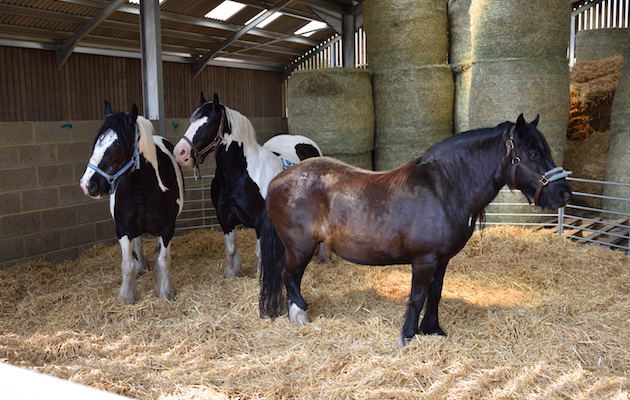The aim of a new and different pilot programme aimed at tackling equine obesity is to help save as many horses’ lives as possible.
The British Equine Veterinary Association (BEVA) is launching a six-month pilot of its new scheme, which was developed using knowledge gained from the behavioural insights team (BIT), a government think tank specialising in behavioural economics and psychology.
{"content":"PHA+VGhlIGlkZWEgaXMgdG8gdXNlIHJvdXRpbmUgYW5udWFsIG9yIHNpeC1tb250aGx5IHZhY2NpbmF0aW9uIHZpc2l0cyBhcyBhIGNoYW5jZSB0byBhc3Nlc3MgZXF1aW5lIGJvZHkgY29uZGl0aW9uLCBhbmQgdXNlIGEgdHJhZmZpYyBsaWdodCBzeXN0ZW0gb2YgdmFjY2luYXRpb24gcmVtaW5kZXIgc3RpY2tlcnMgb24gdGhlIGZyb250IG9mIGhvcnNlIHBhc3Nwb3J0cy48L3A+CjxwPkEgZ3JlZW4gc3RpY2tlciBpbmRpY2F0ZXMgYW4gYW5pbWFsIGluIGhlYWx0aHkgY29uZGl0aW9uLCBhbWJlciBpcyBmb3IgaG9yc2VzIHdobyBhcmUgY2FycnlpbmcgdG9vIG11Y2ggZmF0LCBhZHZpc2luZyB0aGF0IG1vZGVyYXRlIGFjdGlvbiBtdXN0IGJlIHRha2VuLCBhbmQgcmVkIG1lYW5zIHRoZSBhbmltYWwgaXMgY2FycnlpbmcgZXhjZXNzaXZlIGZhdCwgd2hpY2ggaXMgcHV0dGluZyBpdCBpbiDigJxtb3JiaWQgZGFuZ2Vy4oCdLjwvcD4KPHA+PGRpdiBjbGFzcz0iYWQtY29udGFpbmVyIGFkLWNvbnRhaW5lci0tbW9iaWxlIj48ZGl2IGlkPSJwb3N0LWlubGluZS0yIiBjbGFzcz0iaXBjLWFkdmVydCI+PC9kaXY+PC9kaXY+PHNlY3Rpb24gaWQ9ImVtYmVkX2NvZGUtMzEiIGNsYXNzPSJoaWRkZW4tbWQgaGlkZGVuLWxnIHMtY29udGFpbmVyIHN0aWNreS1hbmNob3IgaGlkZS13aWRnZXQtdGl0bGUgd2lkZ2V0X2VtYmVkX2NvZGUgcHJlbWl1bV9pbmxpbmVfMiI+PHNlY3Rpb24gY2xhc3M9InMtY29udGFpbmVyIGxpc3RpbmctLXNpbmdsZSBsaXN0aW5nLS1zaW5nbGUtc2hhcmV0aHJvdWdoIGltYWdlLWFzcGVjdC1sYW5kc2NhcGUgZGVmYXVsdCBzaGFyZXRocm91Z2gtYWQgc2hhcmV0aHJvdWdoLWFkLWhpZGRlbiI+DQogIDxkaXYgY2xhc3M9InMtY29udGFpbmVyX19pbm5lciI+DQogICAgPHVsPg0KICAgICAgPGxpIGlkPSJuYXRpdmUtY29udGVudC1tb2JpbGUiIGNsYXNzPSJsaXN0aW5nLWl0ZW0iPg0KICAgICAgPC9saT4NCiAgICA8L3VsPg0KICA8L2Rpdj4NCjwvc2VjdGlvbj48L3NlY3Rpb24+PC9wPgo8cD5CRVZBIHByZXNpZGVudCBlbGVjdCBMdWN5IEdyaWV2ZSwgd2hvIGlzIG9uIHRoZSBhc3NvY2lhdGlvbuKAmXMgb2Jlc2l0eSBjYW1wYWlnbiB3b3JraW5nIGdyb3VwIGFuZCBjaGFpcnMgaXRzIGV0aGljcyBjb21taXR0ZWUsIGV4cGxhaW5lZCB0aGF0IHRoZSBpZGVhIGlzIHRvIHN0YXJ0IGNvbnZlcnNhdGlvbnMgYWJvdXQgZXF1aW5lIHdlaWdodCwgaXRzIHBvdGVudGlhbCBoZWFsdGggaW1wbGljYXRpb25zIGFuZCBob3cgdG8gYWRkcmVzcyBhbnkgaXNzdWVzLjwvcD4KPHA+RWFjaCBzdGlja2VyIGFsc28gaGFzIGEgUVIgY29kZSwgd2hpY2ggb3duZXJzIGNhbiBzY2FuIHRvIGFjY2VzcyB2aWRlb3MgYW5kIG1vcmUgaW5mb3JtYXRpb24gb24gd2h5IGVhY2ggY29sb3VyIHN0aWNrZXIgaGFzIGJlZW4gZ2l2ZW4sIGFuZCB3aGF0IHRvIGRvIG5leHQuPC9wPgo8cD7igJxPYmVzaXR5IGlzIG9uZSBvZiB0aGUgbWFpbiB3ZWxmYXJlIGlzc3VlcyBpbiB0aGUgVUsgaGVyZCwgYW5kIGl04oCZcyBvbmUgd2UgY2FuIHByZXZlbnQgaWYgd2UgZmluZCB0aGUgcmlnaHQgd2F5cyB0byBnZXQgdGhlIG1lc3NhZ2Ugb3V0IHRoZXJlLOKAnSBNcnMgR3JpZXZlIHRvbGQgPGVtPkgmYW1wO0g8L2VtPi48L3A+CjxkaXYgY2xhc3M9ImFkLWNvbnRhaW5lciBhZC1jb250YWluZXItLW1vYmlsZSI+PGRpdiBpZD0icG9zdC1pbmxpbmUtMyIgY2xhc3M9ImlwYy1hZHZlcnQiPjwvZGl2PjwvZGl2Pgo8cD7igJxPYmVzaXR5IGlzIGEgbWFubWFkZSBkaXNlYXNlLCBpbiB0aGF0IGl0IGNvbWVzIGZyb20gaG93IHdlIGtlZXAgaG9yc2VzOyB0aGVyZeKAmXMgYSBtaXNtYXRjaCBiZXR3ZWVuIHdoYXQgdGhleSBuZWVkIGFuZCB3aGF0IHdlIHBlcmNlaXZlIHRvIGJlIGEgaGFwcHkgbGlmZSBmb3IgdGhlbS48L3A+CjxwPuKAnFdlIGhhdmUgdG8gcmVpbiBpbiBvdXIgZGVzaXJlIHRvIGZlZWQgYW5kIGNsb3RoZSBhbmQga2VlcCB0aGVtIHdhcm0uIE9mIGNvdXJzZSwgcGVvcGxlIGFyZW7igJl0IHRyeWluZyB0byBodXJ0IGhvcnNlczsgcXVpdGUgdGhlIG9wcG9zaXRlLCBidXQgd2UgbmVlZCB0byByZS1jZW50cmUgdGhlIHdheSB3ZSBsb29rIGF0IG91ciBob3JzZXMu4oCdPC9wPgo8ZGl2IGNsYXNzPSJhZC1jb250YWluZXIgYWQtY29udGFpbmVyLS1tb2JpbGUiPjxkaXYgaWQ9InBvc3QtaW5saW5lLTQiIGNsYXNzPSJpcGMtYWR2ZXJ0Ij48L2Rpdj48L2Rpdj4KPHA+TXJzIEdyaWV2ZSBleHBsYWluZWQgdGhhdCBCRVZBIENFTyBEYXZpZCBNb3VudGZvcmQgYXR0ZW5kZWQgYSBEZWZyYS1vcmdhbmlzZWQgZXZlbnQgYXQgd2hpY2ggY2hhbmdpbmcgcGVvcGxl4oCZcyBiZWhhdmlvdXIgdG8gaW1wcm92ZSBiaW9zZWN1cml0eSwgaW52b2x2aW5nIEJJVCwgd2FzIGFkZHJlc3NlZC48L3A+CjxwPkhhdmluZyBsb29rZWQgaW50byB0aGVpciByZXNlYXJjaCBvbiBob3cgcGVvcGxlIHJlYWN0IHRvIGRpZmZlcmVudCBjYW1wYWlnbnMgYW5kIGFjdGlvbnMg4oCUIG9mdGVuIG5vdCBhcyBoYWQgYmVlbiB0aG91Z2h0IOKAlCBhbmQgd2hhdCBhcHByb2FjaGVzIHRlbmQgdG8gd29yaywgdGhlIEJFVkEgdGVhbSBwdXQgdGhpcyBpbnRvIHByYWN0aWNlIGluIHRoZSBvYmVzaXR5IGNhbXBhaWduLjwvcD4KPGRpdiBjbGFzcz0iYWQtY29udGFpbmVyIGFkLWNvbnRhaW5lci0tbW9iaWxlIj48ZGl2IGlkPSJwb3N0LWlubGluZS01IiBjbGFzcz0iaXBjLWFkdmVydCI+PC9kaXY+PC9kaXY+CjxwPuKAnEl04oCZcyByZWFsbHkgY2hhbmdlZCB0aGUgd2F5IHdlIGxvb2sgYXQgc29tZSBwcm9ibGVtcyzigJ0gTXJzIEdyaWV2ZSBzYWlkLiDigJxJdOKAmXMgbm90IGFib3V0IGJlaW5nIGNyaXRpY2FsIGJ1dCB0cnlpbmcgdG8gZWR1Y2F0ZTsgbG90cyBvZiBncmVhdCB3b3JrIGhhcyBiZWVuIGRvbmUsIGJ5IHdlbGZhcmUgY2hhcml0aWVzIGFuZCBvdGhlcnMsIGJ1dCB0aGVyZSBoYXNu4oCZdCBiZWVuIGEgaHVnZSBjaGFuZ2UgaW4gdGhlIG9iZXNpdHkgd2XigJlyZSBzZWVpbmcsIHNvIHdlIHdhbnRlZCB0byB0cnkgdG8gZ28gZnJvbSBhIGRpZmZlcmVudCBhbmdsZS7igJ08L3A+CjxwPk1ycyBHcmlldmUgc2FpZCB0aGUgc3RpY2tlcnMgc2hvdWxkIGhlbHAgc3RhcnQgd2hhdCBjYW4gYmUgYSBkaWZmaWN1bHQgY29udmVyc2F0aW9uLCBhbmQgdGhhdCBpdCBzaG91bGQgYmUgb2YgYmVuZWZpdCB0aGF0IHRoZXkgY29tZSBmcm9tIHZldHMuIEJ1dCBzaGUgd291bGQgaWRlYWxseSBsaWtlIGFsbCBwcmFjdGl0aW9uZXJzIOKAlCBzdWNoIGFzIGZhcnJpZXJzLCBib2R5d29ya2VycyBhbmQgdHJhaW5lcnMsIGV2ZW50dWFsbHkg4oCUIHRvIHByb3ZpZGUgbW9yZSBmcmVxdWVudCB1cGRhdGVzIG9uIGNvbmRpdGlvbiwgc28gdGhlIGluZHVzdHJ5IGlzIHNlbmRpbmcgYSBjb25zaXN0ZW50IG1lc3NhZ2UgdG8gb3duZXJzLjwvcD4KPHA+4oCcSW1hZ2luZSBpZiB3ZSBjb3VsZCBhbGwgd29yayB0b2dldGhlciwgc28gYXQgZXZlcnkgdmlzaXQsIHRoZSBvd25lciB3b3VsZCBrbm93IHdoZXRoZXIgdGhlaXIgaG9yc2UgaGFkIGxvc3Qgd2VpZ2h0LCBvciBtYWludGFpbmVkIGhlYWx0aHkgY29uZGl0aW9uLOKAnSBzaGUgc2FpZC48L3A+CjxwPuKAnFdlIGtub3cgaG93IGRpZmZpY3VsdCBpdCBpcywgYW5kIHdl4oCZcmUgbm90IHBvaW50aW5nIGZpbmdlcnMsIGJ1dCBob3BlZnVsbHkgYnkgYWxsIHdvcmtpbmcgdG9nZXRoZXIsIHdlIG1pZ2h0IHNlZSBmZXdlciBhbmQgZmV3ZXIgb2Jlc2UgaG9yc2VzLjwvcD4KPHA+4oCcSXTigJlzIHRoZSBob3JzZSB3aG8gc3VmZmVycyBhbmQgbm90aGluZyBicmVha3MgbXkgaGVhcnQgbW9yZSB0aGFuIHR1cm5pbmcgdXAgdG8gYSBsYW1pbml0aWMgcG9ueSB3aXRoIHJvdGF0ZWQgcGVkYWwgYm9uZXMsIHdob+KAmXMgZ29pbmcgdG8gZGllIGlmIHdlIGNhbuKAmXQgYWN0IGluIHRpbWUu4oCdPC9wPgo8cD5Xb3JsZCBIb3JzZSBXZWxmYXJlIENFTyBSb2x5IE93ZXJzIHRvbGQgPGVtPkgmYW1wO0g8L2VtPiB0aGUgY2hhcml0eSBpcyDigJxtYXNzaXZlbHkgc3VwcG9ydGl2ZeKAnSBvZiB0aGUgY2FtcGFpZ24uPC9wPgo8cD7igJxEZXNwaXRlIHRoZSBpbnRlcm5ldCBhbmQgcGVlciBwcmVzc3VyZSwgdGhlIG93bmVyLXZldCByZWxhdGlvbnNoaXAgaXMgc3RpbGwgZnVuZGFtZW50YWwgdG8gaG9yc2Vz4oCZIGhlYWx0aCBhbmQgd2VsZmFyZSzigJ0gaGUgc2FpZC4g4oCcUGVvcGxlIHN0aWxsIHZlcnkgbXVjaCBsb29rIHRvIHRoZWlyIHZldHMgYXMgYSByZXNwZWN0ZWQgc291cmNlIG9mIGFkdmljZS48L3A+CjxwPuKAnFdlIGFsc28gcmVjb2duaXNlIHRoYXQgb2Jlc2l0eSBpcyB0aGUgbnVtYmVyIG9uZSB3ZWxmYXJlIGNoYWxsZW5nZSBmYWNpbmcgdGhlIFVLIGhlcmQsIGFuZCB3aGlsZSB0aGVyZSBhcmUgc29tZSBncmVhdCBpbml0aWF0aXZlcywgbWFueSBjbGVhcmx5IGFyZW7igJl0IGNvbnZpbmNpbmcgb3duZXJzIHRvIGNoYW5nZSB0aGVpciBiZWhhdmlvdXIsIGVzcGVjaWFsbHkgYXMgdGhleSBvZnRlbiB0aGluayB0aGV54oCZcmUgYmVpbmcga2luZCBhbmQgZG9pbmcgdGhlIHJpZ2h0IHRoaW5nLuKAnTwvcD4KPHA+TXIgT3dlcnMgYmVsaWV2ZXMgdGhlIHNpbXBsaWNpdHkgb2YgdGhlIHZpc3VhbCBzY2hlbWUgY291bGQgd29yayB3ZWxsLCBpbmNsdWRpbmcgYXMgYSBnb29kIHdheSB0byBzdGFydCBhIGRpZmZpY3VsdCBjb252ZXJzYXRpb24sIGFuZCBhcyBpdCBpcyBiZXR0ZXIgdG8gcHJldmVudCB3ZWlnaHQgZ2FpbiBpbiB0aGUgZmlyc3QgcGxhY2UuIEhlIGFsc28gYmVsaWV2ZXMgaXQgd2lsbCBsaW5rIHdlbGwgd2l0aCBvdGhlciBjaGFyaXRpZXPigJkgd2VpZ2h0LWxvc3MgYWR2aWNlIGFuZCBpbml0aWF0aXZlcy48L3A+CjxwPuKAnFdlIHJlY29nbmlzZSB0aGUgc2NhbGUgYW5kIGNoYWxsZW5nZSBvZiB0aGlzIGVwaWRlbWljIGFuZCBuZWVkIHRvIHRhY2tsZSBpdCBpbiBkaWZmZXJlbnQgd2F5cyzigJ0gaGUgYWRkZWQuIOKAnFdlIGtub3cgZ2VuZXJhbGx5IHRoYXQgZmF0IHNoYW1pbmcgZG9lc27igJl0IHdvcmsgYnV0IHN1cHBvcnRpbmcgcGVvcGxlIHRvIGxvc2Ugd2VpZ2h0LCBvciBvd25lcnMgYXMgdGhlaXIgaG9yc2VzIGxvc2Ugd2VpZ2h0LCBpbiBhIHBvc2l0aXZlIG1hbm5lciwgaGFzIHRvIGJlIHRoZSB3YXkgZm9yd2FyZC7igJ08L3A+CjxwPkhlbGVuIFdoaXRicmVhZCBvZiBEZWJlbiBWYWxsZXkgRXF1aW5lIFZldGVyaW5hcnkgQ2xpbmljIGluIFN1ZmZvbGssIG9uZSBvZiB0aGUgbmluZSBwcmFjdGljZXMgcnVubmluZyB0aGUgcGlsb3Qgc2NoZW1lLCBzYWlkOiDigJxUaGlzIGNhbiBiZSBhIGRpZmZpY3VsdCBzdWJqZWN0IGZvciBjbGllbnRzIHRvIGNvbXByZWhlbmQgYW5kIGFueXRoaW5nIHRoYXQgY2FuIHJhaXNlIG93bmVyIGF3YXJlbmVzcyBoYXMgdG8gYmUgYSBnb29kIHRoaW5nLiBPYmVzaXR5IGlzIGEgd2VsZmFyZSBjaGFsbGVuZ2UgYW5kIGl0IGlzIGltcG9ydGFudCB0aGF0IG93bmVycyBrbm93IGFib3V0IGxhbWluaXRpcyByaXNrIGFzIHdlbGwgYXMgdGhlIG1hbnkgb3RoZXIgZGV0cmltZW50YWwgaGVhbHRoIGlzc3Vlcy48L3A+CjxkaXYgY2xhc3M9ImluamVjdGlvbiI+PC9kaXY+CjxwPuKAnEZhdCBvbiB0aGUgb3V0c2lkZSBpcyBtYXRjaGVkIGJ5IGZhdCBvbiB0aGUgaW5zaWRlIG9mIHRoZSBob3JzZSwgYXJvdW5kIGltcG9ydGFudCBvcmdhbnMgc3VjaCBhcyB0aGUgbGl2ZXI7IHBlb3BsZSBvZnRlbiBkb27igJl0IHJlYWxpc2UgdGhhdC4gSSBob3BlIHRoaXMgc2NoZW1lIHdpbGwgZGlyZWN0IG93bmVycyB0byBsb29rIGF0IGEgcmVsaWFibGUgc291cmNlIG9uIHRoZSBCRVZBIHdlYnNpdGUgYW5kIGRpZ2VzdCB0aGUgaW5mb3JtYXRpb24gaW4gdGhlaXIgb3duIHRpbWUgYW5kIHJlYWxpc2Ugd2UgYXJlIGhlcmUgd2lsbGluZyB0byBoZWxwIHRoZW0u4oCdPC9wPgo8cD5UaGUgcGlsb3Qgc2NoZW1lIHdpbGwgcnVuIGZvciBzaXggbW9udGhzLCBhZnRlciB3aGljaCBjaGFuZ2VzIG1heSBiZSBtYWRlLCB0YWtpbmcgdmV0c+KAmSBmZWVkYmFjayBpbnRvIGFjY291bnQuPC9wPgo8cD4K"}
You may also be interested in…
Credit: Redwings Horse Sanctuary
‘In loving our animals too much we are exposing them unnecessarily to potentially fatal diseases’
Is our equine population heading towards an obesity crisis? A recent report brings the problem into sharp focus, as Andrea
Credit: Jon Stroud Media
‘As a rule, you’ll get much more criticism on a livery yard if you can see ribs than if your
Credit: Spillers/Steve Bardens
©Steve Bardens
Credit: ©Steve Bardens
A new way to monitor body fat in horses has been developed to assist weight loss in equines
Credit: Peter Nixon
‘We want to help recalibrate people’s ideas of a healthy weight’
Stay in touch with all the news in the run-up to and throughout the major shows and events during 2025 and beyond with a Horse & Hound subscription. Subscribe today for all you need to know ahead of these major events, plus online reports on the action as it happens from our expert team of reporters and in-depth analysis in our special commemorative magazines. Have a subscription already? Set up your unlimited website access now
H&H news editor
Eleanor is an experienced journalist who spent over eight years working for local and national newspapers before joining H&H as news editor in March 2016. Passionate about equine welfare and exposing the truth, Eleanor has reported on all aspects of the industry, from Brexit to anti-bullying campaigns, and from dressage rules to mules. Her sport of choice is showjumping, in which she competes her own horses, and she also enjoys reporting at local jumping shows through to international championships.







